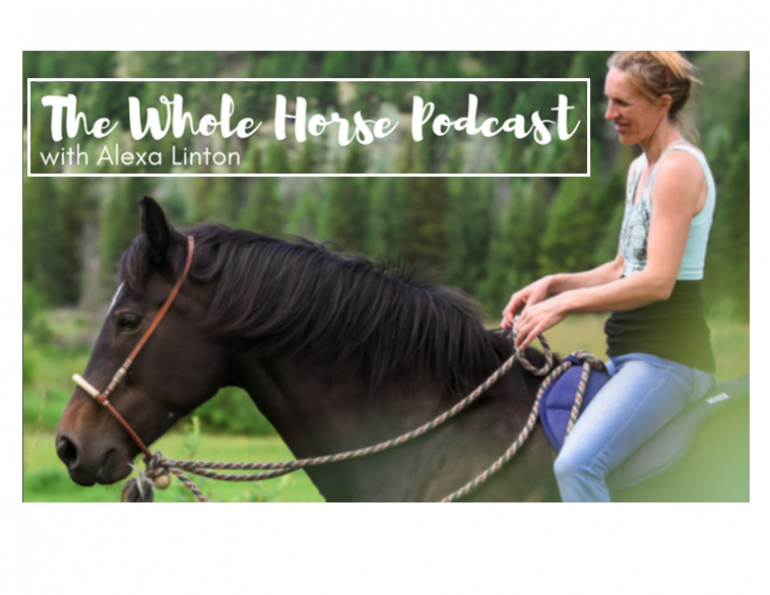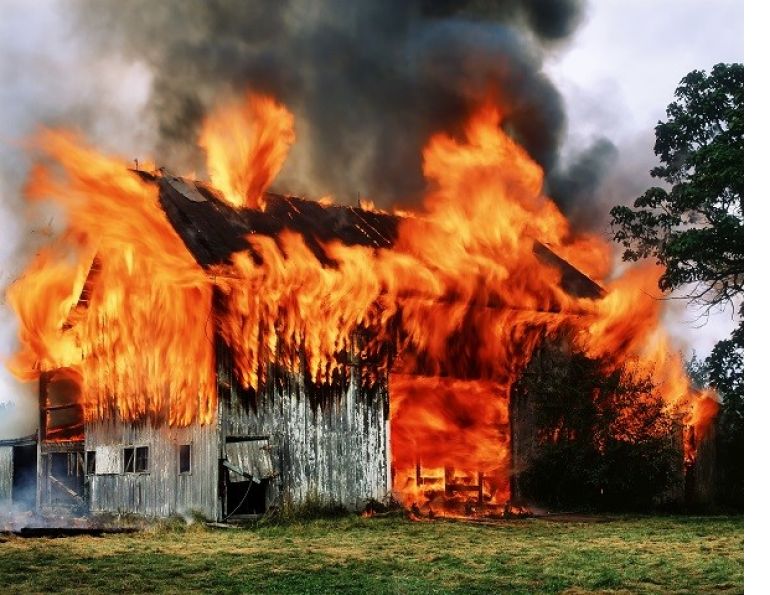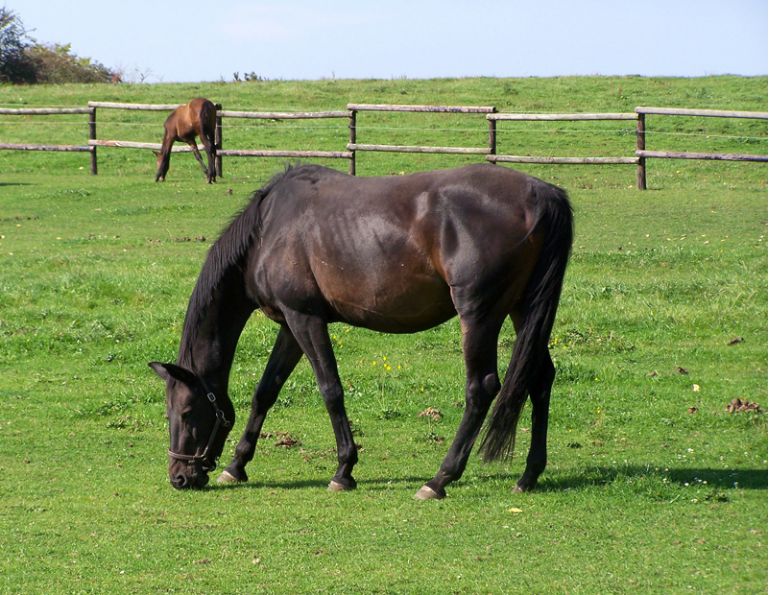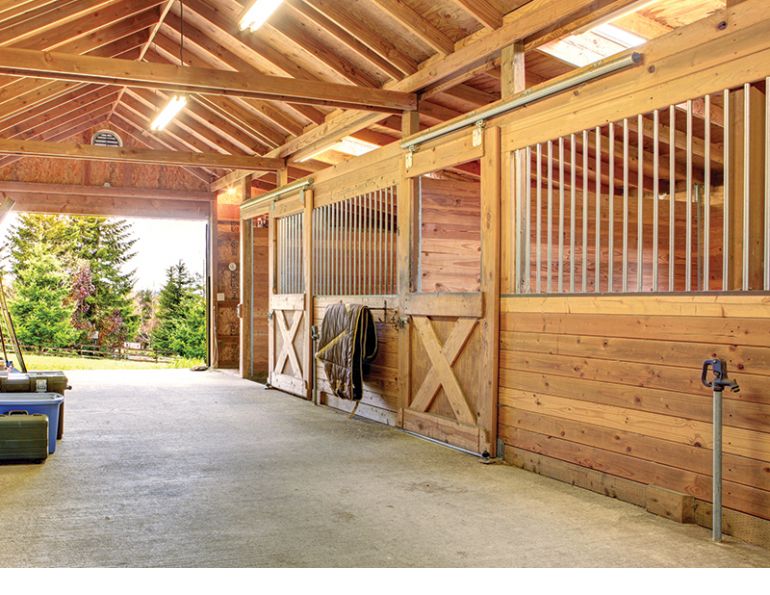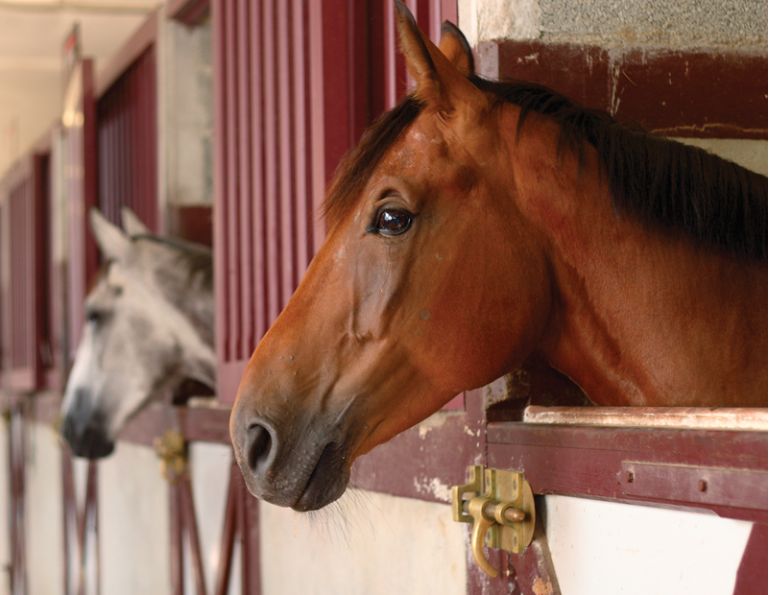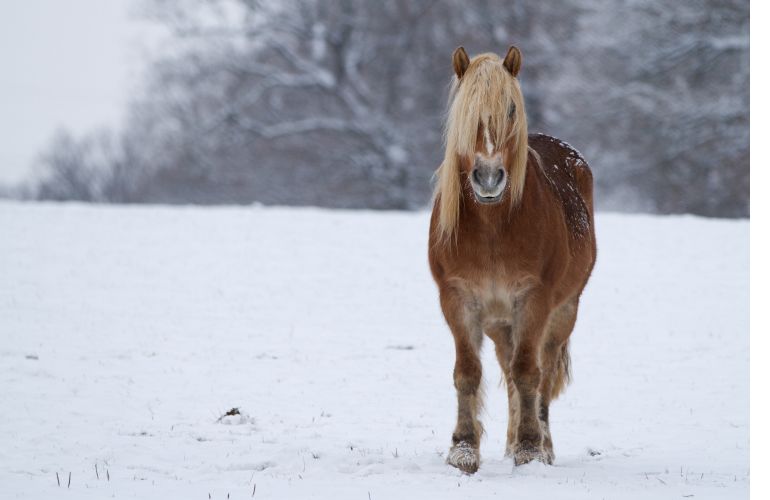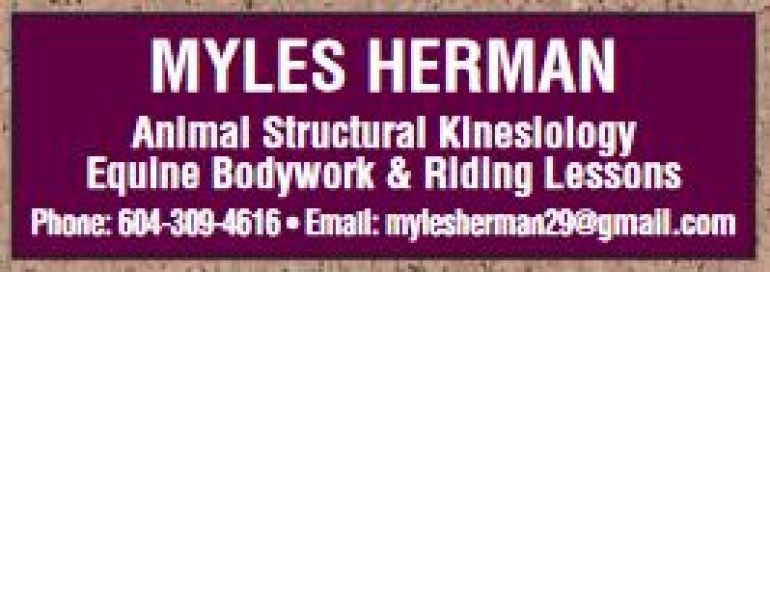Essential Workers
By Tania Millen
Farm dogs and barn cats are indispensable team members at many horse farms. Dogs protect the farm, help round up livestock, keep predators away, tell their owners if a horse is in trouble, and are cherished companions. Meanwhile, barn cats prevent mice and other rodents from taking over the grain bins and hay storage, plus entertain their owners with funny antics. But not every dog or cat is suitable for a horse farm.

These barn cats help the vets at Rivendell Equine Veterinary Services in Grand Valley, Ontario.
Which Dog Breed is Best?
Farm dogs must be reliable, smart, athletic, happy to be out in all weather, keen to participate in human activities, and well-behaved around horses and other animals. Some breeds — and individual dogs — are more suitable than others.
“Ting is a great ranch hand,” says Genie Lynch, whose dog Ting helps her ranch cattle in Valleyview, Alberta. “I ride the community pasture and if I need to move critters, Ting is my gunslinger.”
Sometimes when Lynch is doctoring a calf, the momma cow gets irate and having a dog in the mix really heats up the situation. At times like these, Ting will jump up on the saddle of Lynch’s ranch horse to stay safely out of the way.
Lynch got Ting as a puppy, free with a load of roping steers. He’s three-quarters Blue Heeler and one-quarter Border Collie, and is smart, tough, and fearless.
“The only thing he lives for is my partner and me… and chasing cows,” says Lynch.

Ting the ranch hand is three-quarters Blue Heeler and one-quarter Border Collie. These two breeds are valued for their herding talents and they love having a job. Photos: Genie Lynch
Border Collies, Australian Cattle Dogs, Australian Shepherds, and Blue Heelers like Ting are well-known for their herding abilities — a trait many cattle ranchers find useful. But other farm owners may find them too high strung, or overly keen to herd everyone on the place including ducks and young children. Accordingly, when choosing a dog, matching the expected abilities and personality of the chosen dog with the expectations, animals, and rules of the farm helps prevent frustrated dogs and owners. When selecting a breed, consider the dog’s size, how much it barks, the length of its coat, trainability, how much exercise it needs, friendliness, independence, and common health problems. Many breeds will work but they all have unique traits.
Related: Road Safety for Equestrians
“Sweet T hangs out in the barn while we do chores and has an obstacle course made from hay bales,” says Sonya Edelston, who has a farm on Denman Island, British Columbia. “She’s woken us twice at night when a horse was in trouble, once at 3am when a horse was stuck in a stall and second time at 5am when a horse got hung up while horse camping.”

German Shepherds like Sweet T, shown imitating her toy horse, make excellent farm dogs and are highly trainable. Photo: Sonya Edelston
Sweet T is a 20-month-old purebred German Shepherd whose European parents are bomb-sniffing experts. Shepherds, Doberman Pinschers, Bullmastiffs, and Rottweilers are known for their property protection instincts, but are also exceedingly smart and loyal. Some can be overly protective or aggressive, but with their smarts and high trainability, they often make excellent farm dogs.
Great Danes are another option. Maureen Hall bought Odin, a purebred Great Dane, for her farm in Port Perry, Ontario when he was eight weeks old.
“He helped move the horses into their paddocks, played with our foals, kept opossums out of our hay, and kept the coyotes away, too,” says Hall. “Everyone who came to our farm loved Odin and he was very popular at horse shows.”

Great Danes, like stately Odin, can be as tall as 32 inches at the shoulder, and despite their friendliness and patience with people, can be effective guardians of home and property. The foal shown is wearing Odin’s blanket. Photos: Maureen Hall
Danes don’t live long. Odin passed away at nine-and-a-half years of age but was a great farm dog during his time.
Great Pyrenees, Maremma, Kuvasz, and Anatolian Shepherds are common farm dogs because of their skills as livestock guardians. However, some are known for their wandering ways and may require solid fencing to stay on the job. Meanwhile, terriers and hounds — although sometimes challenging to train and well-known barkers — are great at vermin control.
Every dog is an individual and not all dogs of a particular breed have the traits they’re bred for. Not all dogs have a discernible pedigree, either, but those mongrels or “Heinz 57” dogs often make the best farm dogs.
Related: The 21st Century Cowboy
Jessie Stenson of Kingston, Ontario was driving home in a rainstorm when Abby Rose came into her life.
“The car ahead of me swerved around something and as I got closer, I noticed that it was a little black puppy on the road,” says Stenson. “She was starving and covered in fleas and ticks. We took her to a veterinarian, then she went to a shelter.” The puppy wasn’t claimed so Stenson adopted her. Abby Rose is now three years old, and Stenson guesses she’s a mix of Coonhound and Labrador Retriever.

Abby Rose was rescued by Jessie Stenson, who gave the dog a “forever” home on her farm. Photo: Jessie Stenson
“She loves all our other animals and herds the cows around. She trail rides with us, has great recall, is respectful of the horses, is very athletic, and can run like the wind.”
From livestock herding to property protection and everyday companionship, dogs can be a great addition to any farm and many breeds are up to the task. But what about their friend — or nemesis — the barn cat?
What Makes a Good Barn Cat?
Barn cats can be highly personable and enjoy human company, but many are often more aloof, doing their mousing jobs on the sly with minimal human interaction. Regardless, barn cats are a great addition to any farm as they help keep mice, squirrels, skunks, opossums, racoons, and even other cats out of barns and farm buildings. Cats that are good candidates for the farm must be happy outdoors, keen to hunt, and committed to their home farm.
“Sunflower is an excellent hunter and very affectionate,” says Tracy Soreano who lives in Chelan, Washington with her rescue tabby.

Sunflower, a rescued tabby, is an excellent hunter. Photo: Tracy Soreano
“She’s 13 now but still catches chipmunks and mice. She follows us when we go for walks. She likes the dog and horses, and is very savvy about where to go and hide to avoid the coyotes, bear, and cougar here.”
Related: The Dream of Buying an Acreage
Cat rescues are prevalent across Canada due to an overpopulation of cats. They’re prolific breeders and many aren’t spayed or neutered. One unspayed female cat can have two or three litters of kittens per year and produce one to eight kittens per litter — up to 24 kittens per year. Those kittens are often feral, unsocialized for life with humans, living on urban streets, farms, junkyards, industrial sites, or at garbage dumps. Colonies of cats can form wherever there’s food and shelter. Some of those cats are trapped, neutered or spayed, vaccinated, and offered to outdoor homes such as horse farms. They can make exceptional barn cats.
“Lucky Johnny was trapped and neutered by the Vanderhoof feral cat program, and we got him to be a mouser when he was about a year old,” says Meghan Gandy from Prince George, BC. “We wore big welder gloves to transfer him into our crate. When we got him home, we [kept] him in a warm room in the barn for three weeks. After we let him out, we never saw him. For several months I wasn’t sure if he was still around.

Feral cats like this “wildie” can be adopted as mousers and earn their keep by keeping rodents under control in places like barns, greenhouses, and warehouses. Photo: Tania Millen
“Over the last few years, he’s slowly gotten friendlier and now he’ll let us pet him,” says Gandy. “But I’ve never actually picked him up.”
Non-profit organizations cross Canada offer “barn buddies” programs where feral cats are available for adoption as mousers. The cats work in barns, warehouses, greenhouses, breweries, garden centres, and anywhere else vermin control is needed. Although the cats may be unsuitable as house pets, they still need food, water, and a shelter to call home. But not every barn cat is wild.
Related: Riding Horses in Bear and Cougar Country
“We call Chores the ‘Border Collie cat’ because she thinks she’s a dog,” says Lana Shields of Williams Lake, BC. Shields adopted Chores from a friend who had too many barn cats.

Chores loves to hunt and ride horses. She often rides the horses all by herself in the field. Photo: Lana Shields
“There was this little tabby cat riding horses all by herself in the field,” says Shields. “My friend said she did it all the time. She waited for a horse to line up against the fence and then jumped on. She just rode horses all day.”
Shields took her home. That was nine years ago, and Chores is now a mini-celebrity. She sits in the middle of the arena when Shields rides, rides the horses when Shields is cooling them out, follows whoever is doing chores (hence her name), and rides in the truck and on the tractor.
“It doesn’t matter how cold it is, Chores goes out and hunts,” says Shields. “We can’t go riding without her because she’ll follow us, so I have to put her up in the saddle. She won’t stay home. She follows us everywhere and still goes and rides horses all by herself. She’s a funny little cat.”
Not every barn cat is as friendly as Chores, but any barn cat can be a great addition to a farm, provided they don’t multiply.

An unspayed female cat can produce up to 24 kittens a year. The BCSPCA website describes the overpopulation of cats with not enough homes for them and stresses the importance of spaying and neutering: “Every day, thousands of kittens are born to family pets, stray cats living on the streets, and community (feral) cats. These kittens can get pregnant as early as five months old, producing more kittens and continuing the cycle.”
Ready for New Staff?
Both dogs and cats have a place on farms — in many cases as essential workers — but often as great companions, too. So, if your farm has space, consider adopting a farm dog or barn cat from one of Canada’s many humane societies and rescue facilities. The perfect worker pet is waiting for you.
Related: Family Farms and Ranches
Related: Foxhunting in Canada
Photo: Shutterstock/Christy Berry





